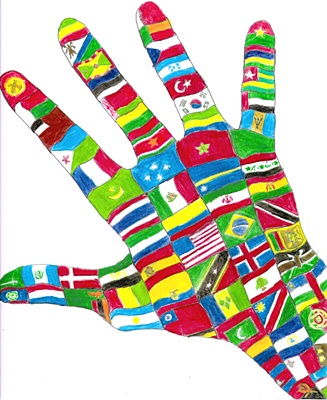All Nonfiction
- Bullying
- Books
- Academic
- Author Interviews
- Celebrity interviews
- College Articles
- College Essays
- Educator of the Year
- Heroes
- Interviews
- Memoir
- Personal Experience
- Sports
- Travel & Culture
All Opinions
- Bullying
- Current Events / Politics
- Discrimination
- Drugs / Alcohol / Smoking
- Entertainment / Celebrities
- Environment
- Love / Relationships
- Movies / Music / TV
- Pop Culture / Trends
- School / College
- Social Issues / Civics
- Spirituality / Religion
- Sports / Hobbies
All Hot Topics
- Bullying
- Community Service
- Environment
- Health
- Letters to the Editor
- Pride & Prejudice
- What Matters
- Back
Summer Guide
- Program Links
- Program Reviews
- Back
College Guide
- College Links
- College Reviews
- College Essays
- College Articles
- Back
What's More American Than?
When the American man in a German ticket office, speaking with a German employee, in Germany uttered the distasteful words, “You people should speak English,” my family all let out a groan – a groan because this rude remark sullied American’s repute. The German ticket employee responded in a husky accent, “So should I expect everyone living in, I don’t know, Iowa, to greet me in German? No.”
When this incident occurred my dad was a Navy pilot and my family had been stationed on a military base in Stuttgart, Germany. We lived there pre-9/11, but still experienced the harsh feelings many Europeans felt toward Americans. Our lack of cultural etiquette (as referenced above) incites the stereotype of “the ugly American”; our physical location, political position, and government policies also influence the bad American reputation abroad.
While living in Germany, my family traveled all around Europe. The countries are in such close proximity to each other; a short Euro Track ride meant a trip to the Dolomites or Paris. But we were the odd ones out on our military base. My mom and dad recall our fellow military families seldom left the base, and when they did, they would go on military sponsored bus tours to shopping centers. “Many people chose to buy Europe and not experience Europe, which made Europeans perceive most Americans as culturally insulated,” (Buck, interview).
And it is true, Americans are insulated; but why? When looking at a map, the United States is bordered by two countries: Canada and Mexico. Germany, for example, is bordered by the Netherlands, Belgium, France, Switzerland, Austria, Czech Republic, Poland, and Denmark. So in geographic terms we are an insulated country in comparison to European countries, where on a three hour drive you can cross multiple borders and encounter different languages and cultures.
The United State’s physical surroundings don’t expose Americans to multiple cultures, nor does our political state. We are a major world power, meaning our government’s policies affect events at the global scale, and our culture influences people across the international scene. Our position should make us more concerned with what is going on in other countries. In reality Americans are isolated with attitudes of “everything is all about me and my country”. As a world power, America holds the playing cards and other countries’ choices don’t seem to affect us, causing us to become insensitive to what is happening in foreign affairs. In a recent survey I conducted, 32% of people knew who the French Prime Minister is (Nicolas Sarkozy) and a mere 8% knew Great Britain’s Prime Minister (Gordon Brown). This statistic tells us: Americans don’t know other countries’ current events.
As a large, powerful country, our actions and policies affect everyone, and in regards to the environment – everything. As my mom recalls, Europeans are disgusted by American’s wasteful lifestyles, as they should be.
Carbon footprint is the amount of greenhouse gases, measured in units of carbon dioxide, produced by human activities. … The average American releases twenty tons of carbon dioxide each year. The average for Europe is nine tons, while the global average is four tons (Walser).
America has the largest carbon footprint in the world, which is a terrible fact. The more enraging aspect, however, is our impartiality to the environment. President George Bush actually withdrew America from the Kyoto Protocol, an agreement between industrialized countries to lower their carbon emissions. We have yet to pass major policies to lower our carbon output. In fact, politicians in Washington still argue human activities don’t cause climate change, although an undisputed fact in scientific communities says otherwise. As a world power we should be creating green solutions to the global climate crisis, but we aren’t.
With our self-centered attitudes and wastefulness, it is no wonder Europeans harbor harsh feelings toward Americans. But there is still hope. With President Barack Obama now in office implementing more diplomacy in foreign affairs, relations with Europe are beginning to look a little brighter. The Transatlantic Trend survey given to Europeans shows 77% of Europeans support how Obama has handled international affairs, compared to the previous 19% who supported former President George Bush. President Obama is improving political relations with Europe, and we can improve the American reputation in Europe. We should start with a goal to better understand foreign countries. At the very least we should begin practicing a little more cultural etiquette – I’m certain President Obama has never told foreign politicians, “You people should all speak English.”

Similar Articles
JOIN THE DISCUSSION
This article has 0 comments.
